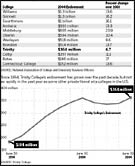 |
 |
|||
|
||||
| Web Sites, Documents and Articles >> Hartford Courant News Articles > | |||
Trinity Contends With Deficit New President Orders Cuts To Close Gap
Despite a record number of applicants and a growing reputation as one of the nation's top urban liberal arts schools, Trinity College is under orders from its new president to close a $10 million deficit and adopt a new sense of financial discipline. "There has been difficulty with overspending here for years and years," said James F. "Jimmy" Jones Jr., who has ordered a campuswide effort to control expenses in everything from buildings and grounds to the admissions office. The private college in Hartford has put maintenance projects on hold, kept some jobs vacant and asked staff members to limit expenses as the school tries to close a budget gap projected to reach $10 million next year. The college already has sliced $3.5 million in expenses this year after the deficit caught many by surprise and spurred a review of the college's financial status, including its fund-raising strategy. Academic departments have been largely spared so far, but the college has not ruled out asking professors to teach extra classes next year or even to accept a pay freeze. "We flat out, for a very long time, have had a culture here of spending whatever we thought we needed to," Jones said, "and expecting the nice folks in the business office to pull a rabbit out of a hat." Part of the problem is that Trinity's $364 million endowment is well below that of other liberal arts colleges in New England such as Williams and Amherst. In the past year, Trinity's endowment did not grow as rapidly as that of many of the colleges it considers its peers. Getting a handle on spending has been made more difficult by a frequent turnover in administration. Jones is Trinity's fifth president in five years, counting interim administrators after the departure of Evan S. Dobelle in 2001 and after the brief presidency of Richard H. Hersh in 2003. The college, which enrolls 2,400 students and has an annual budget of about $110 million, formed a committee that meets weekly to address the deficit. "The more we studied it, the more worried I got," Jones said. Some projects have been put on hold, such as the installation of new lights in a science building and the upgrading of an air-conditioning plant. Small budget items, such as a $20,000 marketing program for high school sophomores, are among dozens of cuts. No savings is too small, Jones said. "Do you buy another photocopier or use the one down the hall?" he said. The school expects to hold its tuition increase next fall in the same range as in the past few years, he said. Tuition rose 5.7 percent this year, pushing the full cost of attending Trinity, including room and board, over the $40,000 mark for the first time. Jones, in his first year at Trinity, brought the financial issue to faculty, staff and students after reviewing quarterly expenses in the fall and finding that spending was running ahead of schedule. Across the nation, other colleges have confronted similar deficits. Smith College in Massachusetts, for example, cut some faculty and non-faculty jobs, revamped its dining program and made other budget cuts last year. "A number of institutions have gone through this kind of belt-tightening and have moved forward nicely," said David L. Warren, president of the National Association of Independent Colleges and Universities. "It's important to note Trinity is not laying off anybody nor eliminating any [academic] programs." The slumping stock market in recent years, along with rising costs in health insurance, technology and building construction, has contributed to the financial squeeze, he said. Students are not likely to notice any immediate change in classroom programs, officials said. "We're determined not to cut the meat out of the academic enterprise here," said Frank G. Kirkpatrick, interim dean of faculty, who, like others, was surprised when Jones outlined the problem. "I had no knowledge of any of this," Kirkpatrick said. "Among the faculty, I don't remember anybody hinting there was a problem." He has asked faculty to consider savings wherever possible, even to watch expenses in areas such as taking job candidates to dinner. Jones also has bolstered Trinity's fund-raising operation, including the recent hiring of a new vice president, Ronald Joyce, a respected fund-raiser at The Children's Hospital of Philadelphia, to head Trinity's development office. One of Joyce's challenges is to build Trinity's endowment. "We're competing with people who have significantly larger endowments," said Paul Raether, chairman of Trinity's board of trustees. "The board has clearly identified this as a top priority." Jones arrived at Trinity with a strong reputation as a fund-raiser. He had been president at Kalamazoo College in Michigan, where he launched a successful fund-raising campaign and led efforts to renovate the campus. Raether praised Jones for
openly confronting the budget deficit, saying it is a problem
that has surfaced in the past. "The
board and finance committee knew last year that it was a horse
race at the very end to have a balanced budget," he said. "Frankly,
people were told to cut expenses, and it wasn't being done."
|
PHOTO |
||
| Last update:
September 25, 2012 | |
|||
|


